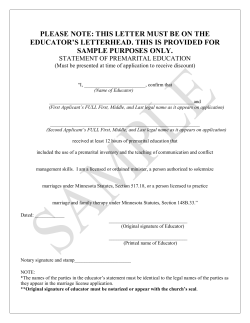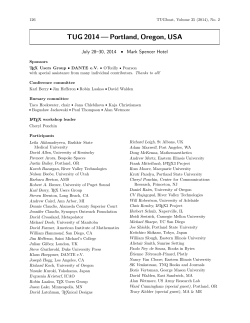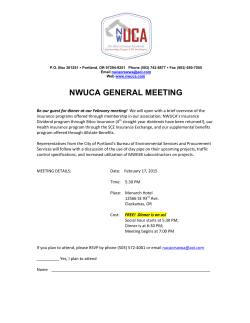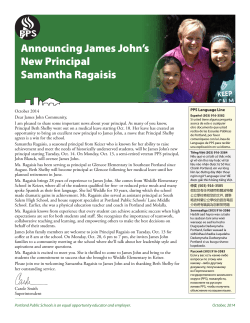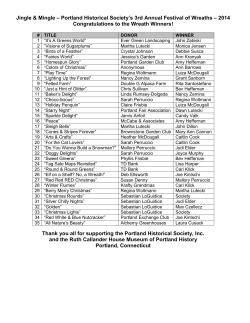
DG Portland 2015 Conference Info
Building Educator Expertise with the Framework for Teaching Danielson Group Conference March 17-18, 2015 Portland State University, Portland, Oregon Learn how the Framework for Teaching unifies the (complex) work of teachers and administrators Portland, Oregon The Building Educator Expertise Conference explores the Danielson Framework for Teaching, a research-based instructional model that defines effective teaching. The most important role of a teacher, administrator, or peer coach is that of instructional Charlotte Danielson leader. To be an effective instructional leader requires deep knowledge of what constitutes good teaching, the skills to identify it when you see it, and the ability to collaborate with colleagues to build reflection, practice, and expertise over time. How to register You can register online at: www.danielsongroup.org/connect/conferences Hear from Charlotte Danielson about the latest research connecting the Common Core to the Framework for Teaching. Plus learn her new thinking about the 6 big ideas of best practice integrated across the Framework components. Sponsor Whether you’re new to the Framework for Teaching, or looking for more in-depth knowledge, this conference has content appropriate for every educator. On Day 1 of the conference, choose from a series of 1 ½ hour sessions and hear from many Framework experts and implementers. On Day 2, choose one of the full-day workshops to extend your skills for applying Framework concepts in your role back home. The Danielson Group is proud to partner with Portland State University for the Building Educator Expertise Conference. Each year, students at Oregon’s largest and most comprehensive school of education master the skills and develop the tools to teach and counsel others. We are deeply entwined in the work lives of Oregon’s educators and counselors, who rely on the school to advance their careers and further hone their talents. Graduate School of Education Connect Promoting Effective Teaching and Professional Learning 20150302 1 Building Educator Expertise with the Framework for Teaching How to Register Register at www.danielsongroup.org/connect/conferences Use a purchase order or credit card to pay the 2-day conference registration fee of $310, which includes continental breakfast and lunch each day. Anne Babina Kristine Deni Dr. Kate Dickson Conference Materials As a registered attendee, you can download all the conference session materials. Registered participants will receive an e-mail notification with a link to conference materials approximately two weeks prior to the conference. Travel and lodging Hotel Reservations Participants are responsible for their own lodging. Please do not make your hotel reservation until you have registered for the conference. The following hotels are within walking distance of Portland State University: • Hilton Portland and Executive Tower • Hotel Lućia Danielson Group staff and consultants have extensive backgrounds in education, along with a deep level of Framework understanding. Collectively, they have conducted more than Joanie Peterson Dr. Jorie Ellis Sue Presler 1600 workshops and consulting service days since 2012. Each consultant has been Lynn Sawyer Phyllis Unebasami Karyn Wright personally selected by Charlotte Danielson and is required to participate in ongoing professional development provided by Charlotte Danielson and the Danielson Group. • Portland Hotel Monaco • University Place Hotel and Conference Center Registration Cancellation • Hotel Modera If you have a paid registration but are unable to attend, contact us no later than 14 calendar days prior to the start of the event to request a refund. There is a $50 processing fee for cancellations. Cancellations less than 14 calendar days prior to the event are not eligible for a refund. At any time, however, you may “transfer” your registration to a substitute attendee. We require authorization in an email from you for such transfers. The Danielson Group will keep the fee from the original registrant as payment for the substitute. You and your substitute are responsible for any financial arrangements regarding the transfer. Parking Hourly parking areas are provided in various locations throughout the Portland State University campus such as Parking Structure One at SW 6th & Harrison or Parking Structure Three at 1631 SW 12th. Street parking around the University is an option and is managed by the City of Portland. Read more details about parking options at PSU at http:// www.pdx.edu/transportation/hourly-visitor-parking. Conference Cancellation Travel Participants are responsible for their own transportation. Please do not purchase nonrefundable airline tickets unless you have received a confirmation e-mail from the Danielson Group. If you do not receive a confirmation e-mail within two weeks of submitting your registration, please call 609-848-8714 to confirm your registration. The Danielson Group reserves the right to cancel the conference. In the unlikely event of a cancellation, you will be notified and will receive a full refund of your registration fee. The Danielson Group is not responsible for any other expenses you may incur for a cancelled event. Connect Promoting Effective Teaching and Professional Learning 20150302 2 Building Educator Expertise with the Framework for Teaching Day 1 Conference Sessions Day 1 Conference Session Descriptions* Schedule 11 8:00–9:00 Registration and continental breakfast 9:00–10:00 Opening keynote by Charlotte Danielson 10:15–11:45 Concurrent sessions 11:45–12:45Lunch Concurrent sessions 2:15–2:30Break 2:30–4:00 Karyn Wright, Henderson, NV In this session, participants will have the opportunity to discover classroom implications of the collaborative observation cycle. By viewing classroom videos, participants will collect evidence, align the evidence to the components of domains two and three of the Framework for Teaching, and discuss ways to use the data collected to encourage teacher growth and learning. Strategies will be shared for supporting administrators and teachers in this collaborative effort to improve teacher practice that will in turn increase student learning. 10:00–10:15Break 12:45–2:15 Getting Teacher Evaluation Right: Supporting Teachers’ Professional Growth using the FfT Concurrent Sessions 12 Idaho Implementing the Framework beyond K-12 Christine Linder, Idaho State University, Pocatello, The Framework for Teaching has become an integral component in Idaho’s educator preparation program. Candidates are assessed on all 22 components and develop a professional learning plan in order to be recommended for initial licensure. One innovative university even conducts evaluations of faculty and provides professional development in student engagement throughout its colleges using the Framework for Teaching. The seamless integration of performance standards from pre-service to in-service has created greater coherence across the professional continuum. Come hear our story. * Session facilitators are subject to change Day 2 Full-Day Workshops Schedule 8:00-9:00 Registration and continental breakfast 9:00-12:00Workshops 12:00-1:00 Lunch and keynote by Charlotte Danielson 1:00-3:30 Workshops continue 3:45-4:15 Closing wrap-up Charlotte Danielson Connect Promoting Effective Teaching and Professional Learning 20150302 3 Building Educator Expertise with the Framework for Teaching Day 1 Conference Session Descriptions 13 Using Teacher Leadership in the Evaluation Process: Roles and Responsibilities Chelsi Sholty, Human Resources Director, Kristin Becker, District Mentor Teacher and School Improvement Coach, Kristy Heller and Liz Postlewait, Teacher Leaders, Lincoln County Schools, OR In this session, you will learn about the Lincoln County School District’s process of implementing the Danielson Framework for Teaching as the district’s evaluation tool through the leadership of teacher leaders in each of the district’s schools. The process for ongoing calibration and professional development of teacher leaders will also be shared. Join us as we share the collaborative relationship between the human resource director, principals, and teacher leaders that continues to move the school district toward fully trained and calibrated teachers and administrators. 14 The Danielson Framework for Teaching and Universal Design for Learning: A Crosswalk Kris Deni, Pennington, NJ Both the Universal Design for Learning framework (UDL) and the Danielson Framework for Teaching (FfT) offer guidance to educators on how to support ALL their students in becoming expert learners. 15 Quality Tier 1 Instruction Using the Danielson Framework as a Professional Growth Model Anne Babina, Glendale, AZ The Framework may be used for many purposes, but its full value is realized in professional growth conversations among practitioners. This session will provide a brief overview of the Framework for Teaching and how it can be used to develop a collaborative observation process to improve teaching and learning within the RTI model. 16 Using Artifacts for Effective Teacher Evaluation: Assembling a “Natural Harvest” Lynn Sawyer, Sparks, NV There are many important aspects of teaching that happen behind the scenes, or are not obvious during a classroom observation. Both teachers and supervisors can gain insight by examining a collection of items that help to demonstrate the teacher’s skill in these hard-to-see teaching actions such as analyzing student work, communicating with parents, or participating in a professional community. This session focuses on assembling the “natural harvest” of what teachers already do (rather than asking them to produce additional work), and choosing which items have the most value for showcasing the teacher’s skills. The Crosswalk between the UDL and Danielson FfT frameworks has grown out of a need among UDL experts in the field. As teachers strengthen their practices by infusing the principles of UDL in their work, their performance within the Danielson FfT will improve. The purpose of this session is to offer support that explicitly provides teachers with the critical connections they need to enhance their planning, instruction, and professional practice. Connect Promoting Effective Teaching and Professional Learning 20150302 4 Building Educator Expertise with the Framework for Teaching Day 1 Conference Session Descriptions 21 Collaborative Coaching using the Framework for Teaching: Inter-visitations, Walk-throughs, and Instructional Rounds Lynn Sawyer, Sparks, NV and Anne Babina, Glendale, AZ In addition to formal, planned observations which typically include pre- and post-observation conferences, there are several other useful models for classroom visitations. These other protocols give supervisors opportunities to provide ongoing substantive and supportive feedback, and continue the dialogue about teaching. This session will present options for these less formal protocols as ways to transform previously meaningless rituals of supervision into powerful processes for thinking and talking about instructional excellence. 22 Teacher Preparation: Preparing the Next Generation of Teachers Dr. Randy Hitz, Dean, School of Education, Portland State University; Charlotte Danielson, Danielson Group LLC; and Laura Gutmann, SCALE Participants are invited to engage in a dynamic round table conversation hosted by Portland State University’s Dean, Randy Hitz with special guests Charlotte Danielson, author of “Framework for Teaching”, and Laura Gutmann from SCALE to discuss how teacher preparation programs are changing to better prepare teacher candidates ready for today’s classrooms. This session will explore the new roles, relationships, and accountability required for teacher preparation programs to successfully prepare candidates to be effective teachers in diverse classrooms. The session will cover the challenges and opportunities for transforming teacher preparation as programs align INTASC Standards, revise curricula, implement new assessments (for example, edTPA,) and integrate effective teaching rubrics (Framework for Teaching) into the programs. 23 Observing the Special Education Classroom: Tools and Techniques for Supervisors Linda Eastlund, Clackamas ESD, OR In this session, you will learn about tools that help provide clarity and specificity to your supervision of special education teachers and service providers. Standards of proficient practice that are based on understandings about the nature of learning and how to promote it, the purposeful nature of serving children with special needs, and the elements of professionalism unique to the field of special education will be shared. Intended for principals, program supervisors and special education administrators, you will learn strategies for delivering constructive feedback that fuels professional growth. 24 Talk about Teaching: Effective Communication and Conferencing Skills Karyn Wright, Henderson, NV According to Charlotte Danielson, “An important mechanism to promote teacher learning…is that of conversation. Through focused and occasionally structured conversation, teachers are encouraged to think deeply about their work, to reflect on their approaches and student responses.” In this session, participants will have the opportunity to discuss and practice the skills of effective communication. Three different categories of professional conversations will be explored: formal reflective conversations, coaching conversations, and informal professional conversations. Connect Promoting Effective Teaching and Professional Learning 20150302 5 Building Educator Expertise with the Framework for Teaching Day 1 Conference Session Descriptions 25 Hiring the Best: How to use the Framework for Finding, Interviewing, Hiring and Mentoring Teachers Joanie Peterson, Ontario, OR exploring one of the key elements in 3a, Expectations for Learning, to know how to effectively communicate to students what are they learning and what they will be doing in a lesson. Teaching is one of the few professions in which novices must assume the same responsibilities as veterans – a daunting task! In this session, you will learn how the Framework for Teaching can provide the foundation for all of the district’s recruitment, hiring, mentoring and coaching programs. By connecting the framework to these processes, teachers become thoughtful practitioners who successfully support student learning as they grow from novices to veterans. 26 Using Data from Teacher Practice in Professional Learning Communities Phyllis Unebasami, Division Director, and Liezl Alcantara, Educational Program Analyst at Kamehameha Schools Office for Educator Growth and Development, Honolulu, HI Drawing from data housed within a performance management and evaluation system, we will explore the role standards of practice play in describing and analyzing teaching. In this interactive session, attendees will be invited to generate recommendations based on the analysis, using experience and expertise in working with the Danielson Framework with leadership, observers, and teachers. Initial findings from the project team will also be shared. 31 Communicating Expectations for Learning with Students Jorie Ellis, Portland, OR On any given day or in any given hour, the first and arguably the most important questions a teacher must be able to answer are, “What do I want my students to learn? When they leave here at the end of the day or the week, what will they know or be able to do, that they don’t know or can’t do now?” Participants will spend this session 32 Attracting, Valuing and Retaining Effective Teachers Phyllis Unebasami, Kaneohe, HI Over the past decade, so much of educational reform is compliance-driven, missing the influential factors that will provide sustainable educational improvement for student learning and accelerate the effectiveness of educators. Join us in an inquiry-based, interactive session to learn how to use the anchors of the Danielson Framework, data, and educator wisdom to create a new vision based on shared goals and agreements. You will explore how to use national and international models for teacher effectiveness to inspire systems improvement conversations, and develop a working model of the current system and challenges within your district. Connect Promoting Effective Teaching and Professional Learning 20150302 6 Building Educator Expertise with the Framework for Teaching Day 1 Conference Session Descriptions 33 Culturally Responsive Pedagogy for Teacher Professional Learning and Evaluation Charlene Williams, Assistant Superintendent, Portland Public Schools and Portland Public Schools teachers and school leaders In today’s multicultural classrooms, no one teaching method will engage all learners. Relating the content you teach to the cultural identity of your students builds a foundation for higher levels of motivation and learning. In this session, Portland Public Schools will present their work in supporting equitable education for ALL students by integrating culturally responsive pedagogy as a key part of their teacher professional learning and evaluation system. 34 Best Practices in 3d: Formative Assessment for Student AND Teacher Learning Anne Babina, Glendale, AZ This session explores the essential question: How do we know students have learned what we intended? Add to your repertoire of formative assessment techniques and feedback strategies and approaches to student self- and peer-assessment. Experience their interconnections throughout the planning and implementation of effective lessons. 35 Beyond Evaluation: How to Use Educator Evaluations to Drive Systemic Change Kate Barker, elementary principal, Stephanie Myhre, Educator Effectiveness Grant Manager, Sharon Webster, assistant high school principal, and Leah Starkovich, Student Achievement Specialist, David Douglas School District, OR Oregon has put a renewed emphasis on measuring educator effectiveness through a rigorous evaluation system aligned to professional learning. Come learn how to move the Framework beyond evaluation into professional learning and shared leadership. Make your evaluation rubric the language of instruction, growth, and improvement in your district. Hear how David Douglas School District uses the Oregon Framework and the Danielson Framework together to drive growth for professional practice and student growth. 36 Implementing the Framework with Integrity to Impact Student Learning Tausha Krohn, teacher, Diane Hardin, elementary principal, Parma School District, Idaho In this session we will share our implementation process using the Framework for Teaching as a model for evaluation over the last several years. We will discuss safeguards to maintain integrity of the Framework as a growth model and integrity to the evaluative process for both educators and administrators. We will highlight ways in which teachers feel our implementation has helped them improve their teaching practice and how in turn it has affected student learning as it is aligned with Common Core Standards. Connect Promoting Effective Teaching and Professional Learning 20150302 7 Building Educator Expertise with the Framework for Teaching Day 2 Conference Full-Day Workshop Descriptions 41 Student Engagement: The Heart of the Framework Jorie Ellis, Portland, OR and Karyn Wright, Henderson, NV In this session, participants will explore the reasons why intellectual engagement is critical to student learning. Opportunities will be provided for participants to develop an understanding and description of “minds on” engagement by experiencing it, through analysis of activities, observing classroom video segments, and analyzing and modifying classroom activities designed for student engagement. 42 Introduction to the Framework for Teaching in Special Education Kris Deni, Pennington, NJ and Joanie Peterson, Ontario, OR Learn the structure, architecture, and vocabulary of the Danielson Framework for Teaching using exemplars from special education settings. Participants will develop awareness of the levels of performance across a variety of disability categories while learning how to use the rubrics to analyze professional practice. Special emphasis is placed on supporting the application of Universal Design for Learning (UDL) in order to enhance attention to component 3c: Engaging Students in Learning. Special Education Scenarios written for each component and level of performance help participants understand, “What would this look like in a special education setting?” 43 Observation Skills Training Phyllis Unebasami, Kaneohe, HI and Sue Presler, Omaha, NE Educational leaders and teachers are important catalysts for shaping and creating structures and practices for student learning. Collaborative processes to collect and analyze data play an important role in advancing teacher effectiveness. Learn how to build capacity in collecting observation data using classroom videos and the Danielson Framework, collaboratively analyze data with teachers, and provide constructive feedback leading to professional growth and reflection to improve professional practices. 44 Learning Focused Supervision: An Introduction to the Model Lynn Sawyer, Sparks, NV and Melissa Linton, Kasilof, AK Learning-focused supervision employs skills for guiding conversations that increase teachers’ abilities to think deeply about their instructional practices and how their choices affect student learning. This introductory session introduces a Continuum of Interactions---coaching, collaborating, consulting, and calibrating---a range of options that fit the teacher’s present context and areas of focus and help them become more self-directed. The session will highlight key communication skills and conversation structures that skilled supervisors employ to maintain productive collegial relationships that are growth producing and learning-focused for novice to more expert teachers. (Model developed by Laura Lipton and Bruce Wellman) 45 The Framework for Teaching Meets the Common Core Kate Dickson, Portland, OR This session is a deeper dive into Charlotte Danielson’s latest work on the Framework and how the six Framework Clusters “Big Ideas” advance effective Common Core teaching practices. These clusters describe the skills demonstrated by accomplished teachers in promoting high levels of student student performance. Participants will gain strategies and tools for collaborative professional learning through peer coaching and observation for: 1) Clarity of Instructional Purpose and Accuracy of Content; 2) Safe, Respectful, Supportive, and Challenging Learning Environment; 3) Classroom Management; 4) Student Intellectual Engagement; 5) Successful Learning by All Students; and 6) Professionalism. In this session participants will gain a deeper understanding of the Framework for Teaching and how the Framework supports effective instructional practices when teaching the Common Core. Connect Promoting Effective Teaching and Professional Learning 20150302 8
© Copyright 2025




